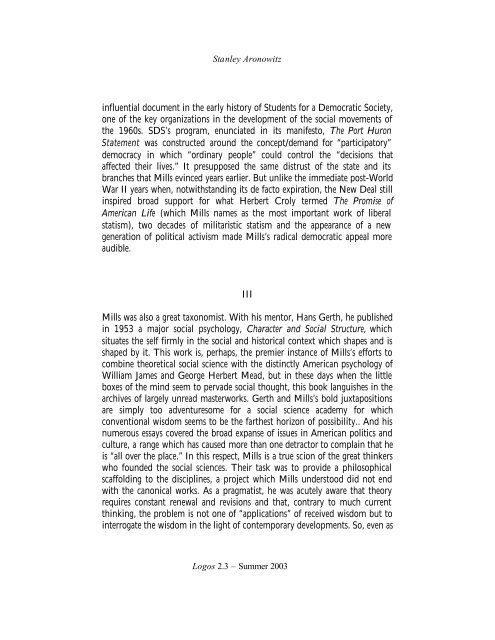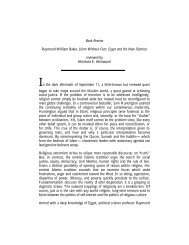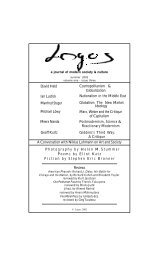Michael J. Thompson Stephen Eric Bronner Wadood Hamad - Logos
Michael J. Thompson Stephen Eric Bronner Wadood Hamad - Logos
Michael J. Thompson Stephen Eric Bronner Wadood Hamad - Logos
Create successful ePaper yourself
Turn your PDF publications into a flip-book with our unique Google optimized e-Paper software.
Stanley Aronowitz<br />
influential document in the early history of Students for a Democratic Society,<br />
one of the key organizations in the development of the social movements of<br />
the 1960s. SDS’s program, enunciated in its manifesto, The Port Huron<br />
Statement was constructed around the concept/demand for “participatory”<br />
democracy in which “ordinary people” could control the “decisions that<br />
affected their lives.” It presupposed the same distrust of the state and its<br />
branches that Mills evinced years earlier. But unlike the immediate post-World<br />
War II years when, notwithstanding its de facto expiration, the New Deal still<br />
inspired broad support for what Herbert Croly termed The Promise of<br />
American Life (which Mills names as the most important work of liberal<br />
statism), two decades of militaristic statism and the appearance of a new<br />
generation of political activism made Mills’s radical democratic appeal more<br />
audible.<br />
III<br />
Mills was also a great taxonomist. With his mentor, Hans Gerth, he published<br />
in 1953 a major social psychology, Character and Social Structure, which<br />
situates the self firmly in the social and historical context which shapes and is<br />
shaped by it. This work is, perhaps, the premier instance of Mills’s efforts to<br />
combine theoretical social science with the distinctly American psychology of<br />
William James and George Herbert Mead, but in these days when the little<br />
boxes of the mind seem to pervade social thought, this book languishes in the<br />
archives of largely unread masterworks. Gerth and Mills’s bold juxtapositions<br />
are simply too adventuresome for a social science academy for which<br />
conventional wisdom seems to be the farthest horizon of possibility.. And his<br />
numerous essays covered the broad expanse of issues in American politics and<br />
culture, a range which has caused more than one detractor to complain that he<br />
is “all over the place.” In this respect, Mills is a true scion of the great thinkers<br />
who founded the social sciences. Their task was to provide a philosophical<br />
scaffolding to the disciplines, a project which Mills understood did not end<br />
with the canonical works. As a pragmatist, he was acutely aware that theory<br />
requires constant renewal and revisions and that, contrary to much current<br />
thinking, the problem is not one of “applications” of received wisdom but to<br />
interrogate the wisdom in the light of contemporary developments. So, even as<br />
<strong>Logos</strong> 2.3 – Summer 2003




